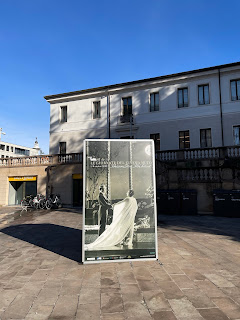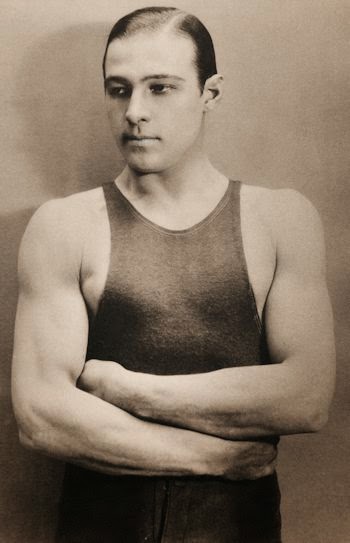Le Giornate del Cinema Muto - Day 1
October 1st is the opening day 1 proper of Le Giornate del Cinema Muto. First order of the day was to head over to the library which houses offices for Le Giornate and our very important festival pass and tote bag with the catalogo, schedule and surprise goodies.
Delighted to add the bluray of Casanova which closed out the festival last year!
The first screening was the beginning of the series riscoperte/rediscoveries of the films of Norma Talmadge. Norma Talmadge is a name little known today, but in the teens and twenties she was huge.
The other series in the riscoperte/rediscoveries are films that survive on 9.5mm show at home Pathe-Baby format. First up was a lovely tinted short using slow motion photography of various species of lillies in Japan, Le Lis du Japon (1913). Two minutes of wonder.
Norma set one began with some of her earliest work from 1910 A Dixie Mother which also starred Florence Turner (as the mother). I have seen this film before, unable to say where except I recognized it immediately. The first, of many films, with the feature of an actor in blackface and the trope of the gratefully enslaved servant. Norma does not have all that much to do as the daughter, the spark of star quality is present.
Mrs. ‘Enry ‘Awkins (1912) has Norma as the daughter who is trying to dry out her soused father and to marry her boyfriend. A lot is crammed in to this 12 minute film. Suffice to say, all ends happily, including with dad who still sneaks out a bottle.
In An Official Appointment (1912) a poor Southern diplomat, down on his luck sells his last possession his horse and buggy to enable him to travel to Washington, DC to apply for a position. In the process he lets his old faithful retainer go (yup, guy in blackface who wants nothing more than to continue to serve his master). So, off he and the faithful servant head to DC and he has no luck in securing a position. Good thing his old faithful retainer can play the fiddle and busk for the rent money. Meanwhile, the jokers at the diplomatic corp send the old man a phony appointment to further humiliate him. On his way to accept the position, he helps out Norma whose horse and buggy have run amuck. Rescuing her from an accident. She also happens to be the daughter of the Secretary of State. The old man soon discovers the ruse and returns to his apartment in despair. Norma pleads his case with her father and goes to deliver good news, sadly, the old man has died (of despair and disappointment?) and the old faithful servant weeps.
Lastly, The Moth (1917) in which Norma in an unhappy marriage (and fabulous gowns) ignores her two children to enjoy a flirtatious lifestyle with hoards of hoipolloi young suitors. Meanwhile, her husband is having an affair with the wife of one of his gambling buddies from the club (a dapper, as always, Adolphe Menjou). I have to say, the chinoiserie apartment the other woman lives in is thoroughly fabulous. The budget was blown on the sets and gowns. Eugene O’Brien (also with a natty mustache) shows up from overseas as a spy/diplomat (we are never quite sure) is another in a line of possible suitors for the already married Norma. Norma, sensing her life is not as it should be tries to pay more attention to her toddlers who are a little afraid of this stranger. Many more plot twists ensue in which her husband ends up murdering the other woman (with what looked like a cap pistol) and he does the honorable thing after his trial by leaving for Europe and setting Norma free. Fadeout with Eugene O’Brien, is it happily ever after, we are not at all sure.
The next program was the first featuring the theme of Ruritania. A 1912 actuality from Czechoslovakia Trke na Banjici (Races at Banjica) which featured lots of parading horsemen. Best, and most appreciated by the audience in the Verdi, were the tracking shots of members of the public moving in and out of frame, rearranging themselves for prime position. One rather short fellow in a straw boater with lots of attitude really caught my eye. Much laughter!
The first feature from Denmark was Den Sorte Kansler/The Black Chancellor (1912) which had everything but the mustache twirling for the villain of the film. Over the top and a fun start to palace and military intrigue. The second feature also from 1912 Sui Grandini del Trono/On the Steps of the Throne has everything but the kitchen sink and an awful lot of riffing on themes from The Prisoner of Zenda. Consensus among some film pals that the Danish film was better than the Italian. Both were just loopy and I loved the Italian film. It had, truly, the most inept attempted assassination. It also had a terrific mirrored dancing sequence with Thais. Good fun.
Opening night, before the feature, offered up more Pathe-Baby, more actuality for Ruritania and The Canon Revisited the amazing Europa made even more so by the accompaniment of Maud Nelissen.
The day closed with the special event and highly anticipated recently restored Lon Chaney film The Unknown. Tod Browning directed, familiar circus theme (set in Madrid). The restoration included 10 minutes of found footage. It was explained that it was not missing scenes (a bit in the beginning which did not add to the plot) more was adding footage to scenes that smoothed transitions and how the film played. I will not spoil the plot of the film, suffice to say, it still has the power to shock. It is quite sick in many ways. The newly composed score was fantastic. Jose Maria Serralde Ruiz really lifted the film to another level. The local Orchestra San Marco also rose to the challenge and composer/conductor and band received a well deserved and noisy standing ovation.
Jay Weissberg welcomed us home, it literally feels like home here.
Movies = 13
Gelato = 1
Bonus = panna cotta




Comments